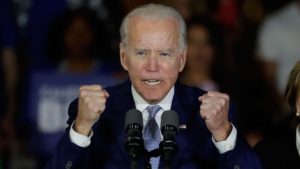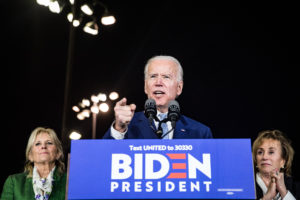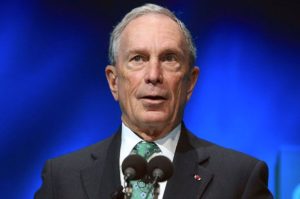 Listen HERE
Listen HERE
Melina Abdullah, a founder of Black Lives Matter in Los Angeles (she’s also Professor of Pan-African Studies at Cal State LA), talks about how the coronavirus raises new issues for Black Lives Matter–while the old ones remain vital–and how it also changes the forms for organizing protest. Also: the campaign to defeat Jackie Lacey as District Attorney in LA. 3-19-2020
Paul Krugman: The Coronavirus and the Economic Crisis; plus John Nichols on elections and Amy Wilentz on the Kushners and the Coronavirus
 Listen HERE
Listen HERE
Paul Krugman, the New York Times columnist and Nobel Prize winning economist, says we don’t have an easy way of responding to the economic threats posed by the coronavirus, and Trump’s preoccupation with the stock market is a big mistake. Krugman’s new book is Arguing with Zombies: Economics, Politics, and the Fight for a Better Future.
Also: we’ll talk about the Republican senators who say paid sick leave for people with the coronavirus will “make workers lazy”—that’s what Ron Johnson says, he represents Wisconsin, and we’ll talk about that with our man in Madison, John Nichols. John also examines everything that went wrong with Tuesday’s elections, and talks about what we must do to ensure there’s no postponement of the November election.
And we’ll also talk about the Kushners and the coronavirus: Jared has been working in some unusual ways, and there’s also virus news about Ivanka and Don Junior. Amy Wilentz reports—she’s our Chief Jared Correspondent. 3/18/2020
Coronavirus Politics: Harold Meyerson & Jeet Heer; Plus Adam Hochschild: “Rebel Cinderella”
 Listen HERE
Listen HERE
Trump’s Oval Office TV address on the coronavirus was followed by the biggest losses in the stock market since 2008. Meanwhile, the House Democrats have proposed a bill that includes paid sick leave, food assistance, and other measures to help wage workers through this pandemic. Will the Republicans pass it? Harold Meyerson comments.
Next up: Can Joe Biden recruit Bernie’s young voters? Also, we need congress to fund a universal vote-by-mail system now: what might the Republican party do about that? Jeet Heer of the Nation magazine comments.
Plus: Fifteen minutes without Trump: Historian Adam Hochschild on his new biography, “Rebel Cinderella: From Rags to Riches to Radical, the Epic Journey of Rose Pastor Stokes”. 3-16-2020
Nichols on Bernie’s Next Steps; Steve Phillips on Big Data; Adam Hocschild on “Rebel Cinderella”
 Listen HERE
Listen HERE
Despite Bernie’s big losses in Michigan and elsewhere on Tuesday, he’s staying in the race to challenge Biden on the issues which Democratic voters support. John Nichols assesses the situation, and talks about what we need to do now about the coronavirus and the elections.
also: What Big Data says about beating Trump: Steve Phillips explains — he wrote New York Times bestselling book Brown Is the New White and he’s the founder of Democracy in Color.
Plus: the story of an immigrant sweatshop worker who became one of the most charismatic radical leaders of the early 20th century. Rose Pastor Stokes has been forgotten, but now a new book tells her amazing story: “Rebel Cinderella.” Author Adam Hochschild explains. 3-11-20
The Problem of Pundits and the Promise of Big Data: L.A. Times op-ed
 It’s been another tough political season for the pundits. Take Super Tuesday. On the Monday before the vote, a typical headline read something like this one from The Hill: “Sanders Poised for Big Super Tuesday.”
It’s been another tough political season for the pundits. Take Super Tuesday. On the Monday before the vote, a typical headline read something like this one from The Hill: “Sanders Poised for Big Super Tuesday.”
On Wednesday, those headlines were replaced by ones like this from CNBC: “Super Tuesday results: Joe Biden shocks the world.”
Predictions gone wrong are nothing new for the punditocracy, of course. . . .
. . . continued at LATimes.com, HERE
Super Tuesday: The Earthquake. John Nichols and Joan Walsh, plus D.D. Guttenplan on Bernie Sanders
 Listen HERE
Listen HERE
John Nichols analyzes the bad night for Bernie–and the tasks that remain if Biden is going to be defeated in the primaries.
Plus: Joan Walsh covered the South Carolina primary and saw first-hand the results of Jim Clyburn’s endorsement of Joe Biden. Also: The meaning of Elizabeth Warren’s defeat.
And D.D. Guttenplan presents the case for Bernie and his movement–The Nation endorsed them this week. 3/5/20
Life After Super Tuesday: Harold Meyerson, plus D.D. Guttenplan on Bernie and Joan Walsh on Elizabeth Warren
 Listen HERE
Listen HERE
Harold Meyerson of The American Prospect says “electability” trumped (no pun intended) both the ground games and the air games of the candidates–so that the one without a ground game OR an air game came out on top.
plus: The Nation has endorsed Bernie, AND his movement–D.D. Guttenplan, editor of the magazine, explains.
also: Joan Walsh talks about the significance of Elizabeth Warren’s defeat — and what Bernie should do next.
3/5/20
Nominating Bloomberg Would Destroy the Democratic Party: Jeet Heer, plus Rick Perlstein on Bernie and Robert Edelman on Sports
 Listen HERE
Listen HERE
Bloomberg can’t win the primaries, but he might try to get the nomination if Bernie doesn’t go to the convention with a majority of delegates. Jeet Heer argues that nominating Bernie would destroy the Democratic Party and assure Trump’s reelection.
Plus: political pundits are supposed to put forward strong opinions – that’s their job. The rest of us may be confused and uncertain and anxious, but the pundits are full of convictions and arguments. Today we depart from that rule and talk to Rick Perlstein – although he has argued for social democracy for decades, he’s got some doubts of his own about Bernie, while he acknowledges all that Bernie has achieved.
Also: the Cold War was fought in many ways: it was a traditional political and military confrontation, but it was also a cultural contest on a global scale – and one of the most important arenas in the cultural contest was sports. Historian Robert Edelman explains: he’s co-editor of the new book The Whole World Was Watching: Sport in the Cold War. 2/26/20
What Bernie Has Already Won: Bob Borosage, plus Joan Walsh on Elizabeth Warren and John Sayles on ‘Yellow Earth’
 Listen HERE
Listen HERE
Bernie has already won–the ideas primary: That’s what Bob Borosage argues. Bernie sets the agenda for the race and the other candidates define themselves in relations to his positions.
Also: pundits have declared that Elizabeth Warren is finished, but we’re not so sure. While Warren came in third in Iowa and fourth in New Hampshire and Nevada, only a hundred delegates have been selected—while more than 1,900 delegates are necessary to win. Eventually, progressives and moderates in the party will have to come together–Could Warren be the unity candidate? Joan Walsh takes up that question.
Plus: John Sayles has directed two dozen films, including Matewan and Lone Star. Here he talks about his new novel, ‘Yellow Earth’—it’s about what happens when shale oil is discovered underneath an Indian reservation in the North Dakota badlands—and outsiders descend. 2/26/20
Elizabeth Warren: Unity Candidate? Joan Walsh, plus Bob Borosage on Bernie and John Sayles on ‘Yellow Earth’
 Listen HERE
Listen HERE
Pundits have declared that Elizabeth Warren is finished, but we’re not so sure. Joan Walsh points out that, while Warren came in third in Iowa and fourth in New Hampshire, only 64 delegates have been selected—there are more than 1,900 delegates still to be picked. The case for Warren at this point remains potent, especially given the success of progressive women in the 2018 midterms.
Also: Bernie has already won the ideas primary in the Democratic Party. That’s what Bob Borosage argues—he sets the agenda for the race and the other candidates define themselves in relations to his positions.
Plus: John Sayles has directed two dozen films, including Matewan and Lone Star. Here he talks about his new novel, Yellow Earth—it’s about what happens when shale oil is discovered underneath an Indian reservation in the North Dakota badlands—and outsiders descend. 2/20/20

